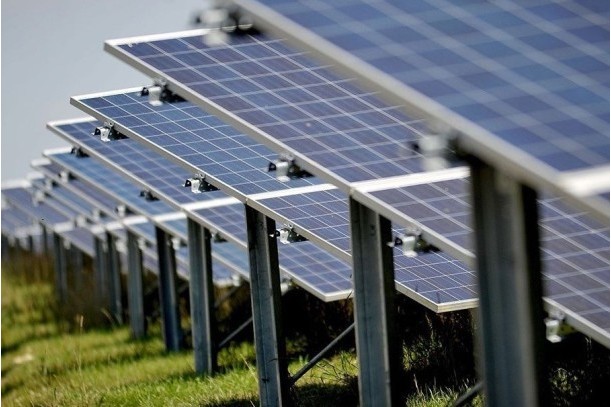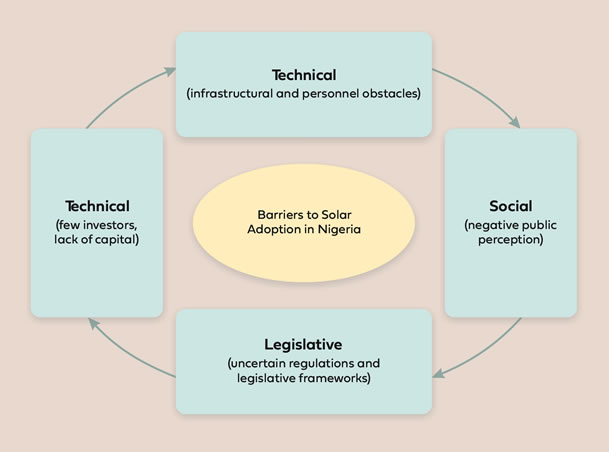Solar energy adoption barriers: a vicious cycle?

Feature Highlight
Although Nigeria possesses renewable energy policies, there is a lack of legislative framework and political will to implement these initiatives.
A couple of months ago, I wrote about some of the barriers to solar adoption in Nigeria. And as I’ve read and researched further into the topic, I began to see an aggravating pattern. Perhaps a potential vicious cycle – a cause and effect relationship where two or more elements exacerbate each other and make a situation worse.
When looking at barriers to solar adoption in Nigeria, that seems to be the case. Technical issues worsen social perceptions on solar energy. Negative public perception of solar energy causes a lack of urgency in solving legislative obstacles, which in turn limit the available financial resources for the sector. This lack of financial resources can then be blamed for the technical faults in the first place.
So how do you stop a vicious cycle? Where do you intercept to create a solution, to grow the market, and accelerate the adoption of solar energy in the country with the biggest energy deficit in the world?
For that answer, we need to take a deeper dive into the relationship between the obstacles.
From technical to social
Technical barriers to solar energy adoption include both infrastructural and personnel issues. Infrastructural issues themselves range from problems in large scale transmission infrastructure to existing electrical issues in family homes.
For example, in 2016 the government of Nigeria signed a power purchase agreement (PPA) worth $2.5 billion with 14 independent power producers for solar power plants across the country which was expected to add about 1.1 GW of power to the grid. However, those projects were stalled for several reasons, one of which was concern that the existing transmission infrastructure could not accommodate the additional power generation.
Inadequate infrastructure can also be applied to a smaller scale. There are cases when a family’s installation of solar energy systems does not go as planned. This is not necessarily due to faulty solar energy systems, instead it can be due to existing electrical wiring issues that were not identified and addressed prior to the installation.
These infrastructural issues lead us to the other type of technical barrier: lack of skilled personnel in installing and maintaining solar systems. If existing solar providers, distributors, or installers don’t have the resources to hire and train personnel that can effectively provide customer services then all of these technical issues only exacerbate negative public perception of solar energy.
Here is where we transition into the social barrier. Negative public perceptions towards solar energy are a major obstacle to its increased adoption. This negative perception can be due to a multitude of reasons from lack of knowledge about solar energy and solar’s high initial costs, to negative experiences with solar system products or services.
Producers, distributors, and installers of solar energy need reliable and knowledgeable staff that can move beyond this social barrier, and form credibility with both existing and potential customers. If they don’t, then this negative social perception of solar energy adds to a lack of demand and therefore lack of urgency to address regulatory issues that further stall solar adoption.
From social to legislative
Although Nigeria possesses renewable energy policies, there is a lack of legislative framework and political will to implement these initiatives. Circling back to the 2016 PPA, an activation agreement of the PPA was set to be executed June 2022, six years after the initial agreement had been signed. Even then, disagreements over tariff structures remained an obstacle for the effectiveness of the project.
But large-scale projects are not the only ones affected by uncertain regulations. Solar energy entrepreneurs are also affected by the lack of clear solar energy policies and policy implementation that discourage national and international investors.
From legislative to financial
Investors need to be confident in the viability and credibility of the solar energy sector in Nigeria. Lack of clear solar energy policies and legislation already discourage investors, and the quality of technology and infrastructure doesn’t inspire much trust either. Without investors, there is a lack of capital. Capital that can be used to hire and train staff, to design customer education campaigns, and to develop affordable and reliable products.
The financial barrier affects producers of solar energy and consumers equally. Without the capital to develop their businesses, it is difficult for producers to address other barriers to consumption, such as high initial costs and lack of financing alternatives for consumers.
This lack of capital leads us back to existing technical obstacles and thus our vicious circle is complete.
It seems like obstacles to solar energy adoption encompass everything everywhere all at once. Instead of being discouraged, we should remember that market creation starts with identifying and understanding what barriers need to be reduced, and we’ve just taken this step together.
Sandy Sanchez is a Research Associate, Global Prosperity, Clayton Christensen Institute.
Other Features
-
Implications of SEC’s revised minimum capital requirements for ...
Capital Market Operators should ensure that they implement robust controls to ensure that any funds introduced in the ...
-
Building health systems for Africa’s vaccine sovereignty
The imperatives of reducing risk, strengthening markets, securing health futures
-
Analysis of CBN’s new regulations on cash management and dual ...
By revising cash policies and mandating dual connectivity for payment terminals, the Central Bank of Nigeria seeks to ...
-
Africa’s crypto investment market: where growth may emerge next
Africa’s crypto investment market: where the next growth coould explode.
-
Lessons from the 2025 Goalkeepers Report: What kind of innovation ...
The 2025 report issues a clear call to action for policymakers and engaged citizens.
-
Profit: The most powerful engine for scaling impact, dignity, and ...
The most prosperous countries in the world are not those with the most aid programmes. They are those with the most ...
-
Expect turbulent asset markets in 2026
The negative impact of Trump’s tariff and immigration policies will be felt more acutely in 2026.
-
The scars of partition
Contrary to his rosy assurances, partitions often result in tragedy, as borders drawn by cartographers rarely align ...
-
Best site to sell Bitcoin in Nigeria (Fast BTC to Naira in 2026)
Apexpay stands out because it focuses on what Nigerian users actually want: speed, good rates, and simplicity.
Most Popular News
- Artificial intelligence can help to reduce youth unemployment in Africa – ...
- NDIC pledges support towards financial system stability
- Grene Capital spins out of Actis as independent real asset fund manager
- Cairo events focus on Africa’s asset integrity and cybersecurity
- Cuts to donor funding threaten the right to health
- Global job quality stagnates despite resilient growth – ILO















